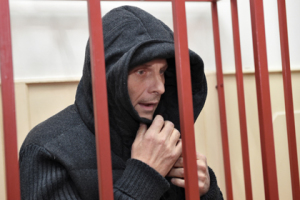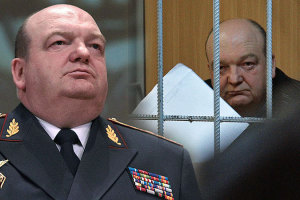
The arrest of Sakhalin region Governor Alexander Khoroshavin will probably become one of the most publicized examples of the Russian federal government’s anti-corruption activity. State controlled media covered numerous stories about an extremely expensive pen, chinchilla throws and other similar items describing the incredibly luxurious life style of the governor of Russia’s largest island. Khoroshavin’s big appetite may be explained by the region’s wealth since Sakhalin is extremely rich in mineral resources and its economy is ranked 24th in Russia, which is not bad for one of the most remote territories of the “great empire.”
Similar much-publicized anti-corruption cases of the last 10 years and especially their outcomes are worth remembering here.
The 2005 case against Ivanovo Region Governor Vladimir Tikhonov was closed for absence of the crime in the act. In 2006, the court imposed a three-year suspended sentence on Governor of the Nenets Autonomous District Aleksei Barinov. In 2007, the court acquitted Governor of the Amur Region Leonid Korotkov of all charges. In 2008, Primorsk Regional Governor Sergei Darkin’s house and office were searched. However, there is no information about these searches resulting in any criminal prosecution against him. Although it seems that the majority of corrupt governors manage to avoid serious criminal liability, there are exceptions to this rule. Thus, in 2011, former Governor of the Tula Region Vyacheslav Dudka was sentenced to 9.5 years in a tough security penitentiary.
Now let us get back to Sakhalin. Alexander Khoroshavin has been governor of the Sakhalin region since August 9, 2007, when he was nominated by Putin. There is no need to explain to what background checks and clearances each gubernatorial candidate is subject. It is also worth reminding that the Russian Federal Security Service (FSB) possesses exhaustive information about every candidate including “compromising materials.” Khoroshavin has been governor for 7 years and was last reassigned for this post in August 2011. Meanwhile, first known cases of inappropriate spending of budgetary funds in the Sakhalin region date to 2009.
In recent years, such cases have been becoming increasingly frequent, and the governor has only been adding fuel to the fire by spending 2 billion rubles on the construction of a sport facility and another 680 million rubles to “improve the image of the governor,” as well as by approving similar expensive projects such as the purchase of limousines and helicopters and other expensive items. The governor himself responded to public criticism by saying that “one finds it hard to carry out one’s constructive effort because our society is torn and mentally ill”. Khoroshavin seems to be very confident about the state of his own mental health as well as about spending budget funds on projects that are as corrupt as they come.
Regardless of the outcome of Khoroshavin’s case, judging by the actions of law enforcement officials and the logic of Moscow’s HR decisions, the federal

government seems to be following the worse-is-better rule by deliberately allowing people with a certain background to be appointed to such high posts. It cannot be ruled out that the existence of some compromising material is actually one of the selection criteria, and the more kompromat against a given candidate the
government possesses, the more chances this candidate has of becoming governor and “honorably” serving as such until the Kremlin decides to dismiss him for one reason or another. His future will then depend on his ability to protect himself against corrupt law enforcement officials who will sooner or later come looking for him following an order by the Kremlin or the FSB, since investigators, judges, prosecutors, penal servants and other guards of the regime are assigned to their posts by the same body that nominates governors, and this makes them equal. Thus, on March 31, former head of the Federal Penitentiary Service (FSIN), Alexander Reimer was accused of embezzling around 3 billion rubles allocated for the purchase of electronic monitoring bracelets and taken to custody.





